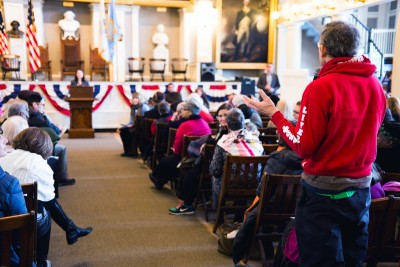Boston Mayor Martin Walsh and the city’s Elderly Affairs Commission hosted a Civil Academy class Saturday to address the program Age-Friendly Boston, which works with various departments to make Boston as conducive to older residents as possible.

Approximately 75 people attended the event, which was held in Faneuil Hall’s Great Hall.
Boston is part of the network of the World Health Organization’s Age-Friendly Communities, an international effort to help cities prepare for rapid population aging and the parallel trend of urbanization, according to a Thursday press release.
“The reason we’re here today is to listen,” Walsh said. “Today is about making sure we encourage safe, walkable cities and making sure we have safe transportation for our seniors.”
Walsh addressed several issues concerning elderly citizens including housing, transportation and access to public facilities and resources such as senior centers. Following Walsh’s speech, many attendees spoke up about their own concerns.
Michael Festa, Massachusetts state director of AARP, spoke about the potential benefits for AARP members in the city if residents work together with the mayor to direct Age-Friendly Boston.
“Marty Walsh has the commitment,” he said. “We’re here to listen to you. In fact, by listening, it’s going to be a lot better in the process to understand that some of the work that needs to be done will come from the good thinking of those of you who have lived in the neighborhoods and understand better than any of us what really needs to get done to make Age-Friendly a reality for your neighborhood.”
Festa said AARP and the mayor’s office are working together to address the needs of not only the elderly, but all Boston residents.
“We have a number of officials focused on making Age-Friendly a reality,” he said. “Part of what we’re trying to do at AARP is to underpin all of the efforts of the mayor and reinforce the notion that this is not just about senior citizens. This is about all age groups.”
Upon arrival, attendees were handed a packet which offered space for recommendations as well as the WHO’s “Checklist of Essential Features of Age-Friendly Cities.”
Gloria Coney, president of the Franklin Park Area and Grove Hall chapter of AARP, said beyond the event, the responsibility for real change lies with the mayor.
“Under the past mayor, there were a lot of good things done, but now this mayor has to put teeth into programs. He has to change laws, he has to make laws, and that’s what we’re looking for,” Coney said. “We’re looking for safety, we’re looking for housing, and we really do, and I believe in this model. I truly believe in it.”
Coney said the money exists to implement the changes, contrary to other attendees expressing worries regarding financing the ideas.
“It really works if you have the people, and unlike these people, I’m not worried about the money because the corporate structure and politicians can do whatever they want to do, so I believe in asking for the sun and expecting it, because they can find the money if you push them,” Coney said.
Several attendees said the Civil Academy provided for a place to recognize seniors as a minority, but there are still aspects of their lives that need to be addressed.
Elizabeth Sands, 66, of Beacon Hill, said the diversity of attendees was encouraging.
“I was quite impressed by the mix of people here and the diversity of the speakers and have noticed that over the 40-something years I’ve been active, that the diversity has really come to the forefront, and it’s not just do-gooders and people who are a single color or an ethnicity feeling that they’re reaching out,” she said.
Dave Kubiak, 57, of the North End, said the shrinking population of seniors in certain communities can be attributed to housing costs.
“When I first moved to the North End 30 years ago, I was 27 years old,” he said. “I was part of a minority age group. Thirty years later, I’m part of another minority age group, and so we’re seeing a dwindling older community in our neighborhood for very real reasons. One of the key causes is the lack of affordable housing.”
Victor Brogna, 80, of the North End, said there needs to be a greater focus on seniors’ psychological conditions, as well as their physical conditions.
“The seniors’ body is being well-addressed here, but the seniors’ mind and emotions are not part of the conversation, and they should be,” he said. “It needs to happen on a neighborhood-by-neighborhood basis.”






















































































































